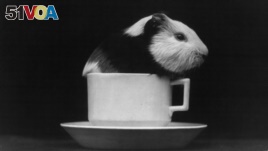16 March, 2018
Our story today is called "Pigs is Pigs." It was written by Ellis Parker Butler.
Mike Flannery, the agent of the Interurban Express Company, leaned over the desk in the company's office in Westcote and shook his fist. Mr. Morehouse, angry and red, stood on the other side of the desk shaking with fury. The argument had been long and hot. At last Mr. Morehouse had become speechless.

Pigs is Pigs
The cause of the trouble lay on the desk between the two men. It was a box with two guinea pigs inside.
"Do as you like, then!" shouted Flannery. "Pay for them and take them. Or don't pay for them and leave them here. Rules are rules, Mr. Morehouse. And Mike Flannery is not going to break them."
"But you stupid idiot!" shouted Mr. Morehouse, madly shaking a thin book beneath the agent's nose. "Can't you read it here – in your own book of transportation rates? ‘Pets, domestic, Franklin to Westcote, if correctly boxed, twenty-five cents each.'"
He threw the book on the desk. "What more do you want? Aren't they pets? Aren't they domestic? Aren't they correctly boxed? What?"
He turned and walked back and forth rapidly, with a furious look on his face. "Pets," he said. "P-E-T-S! Twenty-five cents each. Two times twenty-five is fifty! Can you understand that? I offer you fifty cents."
Flannery reached for the book. He ran his hand through the pages and stopped at page sixty-four.
"I don't take fifty cents," he whispered in an unpleasant voice. "Here's the rule for it: ‘When the agent be in any doubt about which two rates should be charged on a shipment, he shall charge the larger. The person receiving the shipment may put in a claim for the overcharge.' In this case, Mr. Morehouse, I be in doubt. Pets them animals may be. And domestic they may be, but pigs I'm sure they do be. And my rule says plain as the nose on your face, ‘Pigs, Franklin to Westcote, thirty cents each.'"
Mr. Morehouse shook his head savagely. "Nonsense!" he shouted. "Confounded nonsense, I tell you! That rule means common pigs, not guinea pigs!"
"Pigs is pigs," Flannery said firmly.
Mr. Morehouse bit his lip and then flung his arms out wildly. "Very well!" he shouted. "You shall hear of this! Your president shall hear of this! It is an outrage! I have offered you fifty cents. You refuse it. Keep the pigs until you are ready to take the fifty cents. But, by George, sir, if one hair of those pigs' heads is harmed, I will have the law on you!" He turned and walked out, slamming the door. Flannery carefully lifted the box from the desk and put it in a corner.
Mr. Morehouse quickly wrote a letter to the president of the transportation express company. The president answered, informing Mr. Morehouse that all claims for overcharge should be sent to the Claims Department.
Mr. Morehouse wrote to the Claims Department. One week later he received an answer. The Claims Department said it had discussed the matter with the agent at Westcote. The agent said Mr. Morehouse had refused to accept the two guinea pigs shipped to him. Therefore, the department said, Mr. Morehouse had no claim against the company and should write to its Tariff Department.
Mr. Morehouse wrote to the Tariff Department. He stated his case clearly. The head of the Tariff Department read Mr. Morehouse's letter. "Huh! Guinea pigs," he said. "Probably starved to death by this time." He wrote to the agent asking why the shipment was held up. He also wanted to know if the guinea pigs were still in good health.
Before answering, agent Flannery wanted to make sure his report was up to date. So he went to the back of the office and looked into the cage. Good Lord! There were now eight of them! All well and eating like hippopotamuses.
He went back to the office and explained to the head of the Tariff Department what the rules said about pigs. And as for the condition of the guinea pigs, said Flannery, they were all well. But there were eight of them now, all good eaters.
The head of the Tariff Department laughed when he read Flannery's letter. He read it again and became serious.
"By George!" he said. "Flannery is right. Pigs is pigs. I'll have to get something official on this." He spoke to the president of the company. The president treated the matter lightly. "What is the rate on pigs and on pets?" he asked.
"Pigs thirty cents, pets twenty-five," the head of the Tariff Department answered. "Then of course guinea pigs are pigs," the president said.
"Yes," the head of the Tariff Department agreed. "I look at it that way too. A thing that can come under two rates is naturally to be charged at the higher one. But are guinea pigs, pigs? Aren't they rabbits?"
"Come to think of it," the president said, "I believe they are more like rabbits. Sort of half-way between pig and rabbit. I think the question is this – are guinea pigs of the domestic pig family? I'll ask Professor Gordon. He is an expert about such things."
The president wrote to Professor Gordon. Unfortunately, the professor was in South America collecting zoological samples. His wife forwarded the letter to him.
The professor was in the High Andes Mountains. The letter took many months to reach him. In time, the president forgot the guinea pigs. The head of the Tariff Department forgot them. Mr. Morehouse forgot them. But agent Flannery did not. The guinea pigs had increased to thirty-two. He asked the head of the Tariff Department what he should do with them.
"Don't sell the pigs," agent Flannery was told. "They are not your property. Take care of them until the case is settled."
The guinea pigs needed more room. Flannery made a large and airy room for them in the back of his office.

Guinea Pig
Some months later he discovered he now had one hundred sixty of them. He was going out of his mind.
Not long after this, the president of the express company heard from Professor Gordon. It was a long and scholarly letter. It pointed out that the guinea pig was the cavia aparoea, while the common pig was the genus sus of the family suidae.
The president then told the head of the Tariff Department that guinea pigs are not pigs and must be charged only twenty-five cents as domestic pets. The Tariff Department informed agent Flannery that he should take the one hundred sixty guinea pigs to Mr. Morehouse and collect twenty-five cents for each of them.
Agent Flannery wired back. "I've got eight hundred now. Shall I collect for eight hundred or what? How about the sixty-four dollars I paid for cabbages to feed them?"
Many letters went back and forth. Flannery was crowded into a few feet at the extreme front of the office. The guinea pigs had all the rest of the room. Time kept moving on as the letters continued to go back and forth.
Flannery now had four thousand sixty-four guinea pigs. He was beginning to lose control of himself. Then, he got a telegram from the company that said: "Error in guinea pig bill. Collect for two guinea pigs -- fifty cents."
Flannery ran all the way to Mr. Morehouse's home. But Mr. Morehouse had moved. Flannery searched for him in town but without success. He returned to the express office and found that two hundred six guinea pigs had entered the world since he left the office.
At last, he got an urgent telegram from the main office: "Send the pigs to the main office of the company at Franklin." Flannery did so. Soon, came another telegram. "Stop sending pigs. Warehouse full." But he kept sending them.
Agent Flannery finally got free of the guinea pigs. "Rules may be rules," he said, "but so long as Flannery runs this express office, pigs is pets and cows is pets and horses is pets and lions and tigers and Rocky Mountain goats is pets. And the rate on them is twenty-five cents."
Then he looked around and said cheerfully, "Well, anyhow, it is not as bad as it might have been. What if them guinea pigs had been elephants?"
Download activities to help you understand this story here.
Now it's your turn. Did you ever have an experience with an official who did not understand you? Write to us in the Comments Section or on 51VOA.COM.
_______________________________________________________________Words in This Story
interurban - n. between cities or towns
guinea pig - n. a small furry animal, or rodent, that is often kept as a pet
hippopotamus - n. a large African animal that has an extremely large head and mouth and short legs and that spends most of its time in water
genus - n. a group of related animals or plants that includes several or many different species
telegram - n. a message that is sent by telegraph (an old-fashioned system of sending messages over long distances by using wires and electrical signals)